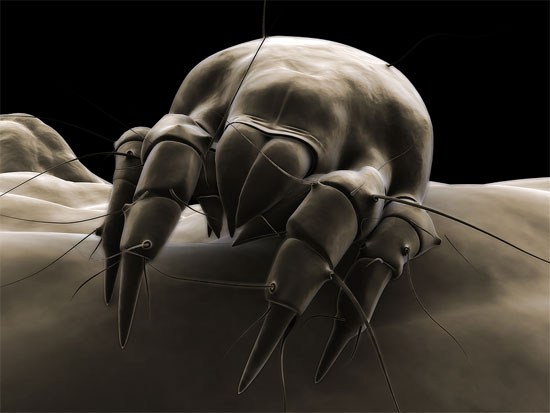Biological evolution
When it comes to evolution, people still believe that this is the process you can't go backwards. However, a new study that finds evolution is not always the process of moving forward, in one direction.
Two scientists from the University of Michigan (USA) have discovered the case of 'reverse evolution' organisms when conducting research on the genes of a common house dust mite.
According to the team, the house dust mites live on cushions, sofas and carpets even in the cleanest houses. They are evolutionary products from parasites that are also descendants of free-living organisms millions of years ago.

House dust mites are 'reverse evolution' creatures, due to abandoning parasitic lifestyles
return to a free life style like their ancient ancestors. (Photo: Daily Mail)
'All of our analyzes show that house dust mites have given up on parasitic lifestyles to turn into free-living organisms like their ancient ancestors, then adapt to many habitats, including human residence ' , quoted the research report by scientists Pavel Klimov and Barry O'Connor.
The house dust mite is a spider animal, the Pyroglyphidae family. They also have 8 legs like spiders and are among the most diverse creatures on Earth.
House dust mites are the most common cause of allergy symptoms in humans, affecting about 1.2 billion people worldwide.
Despite the huge impact on human health, scientists still do not know much about the evolutionary relationships between these dust-sized organisms.
According to Klimov and O'Connor, there are currently 62 different hypotheses published about the origins of today's free living dust mites. In his study, Klimov and O'Connor thoroughly reassessed all the hypotheses to see whether house dust mites evolved from a free-living ancestor or parasite - host-based creature. and harm the "benefactor" to feed me.
The two scientists used large-scale DNA sequencing, building detailed evolutionary plants and analyzing and examining hypotheses. The results are amazing because it goes against the inherent view that highly specialized parasites cannot return to their ancestral lifestyle.
- Biological Era 2.0: When people accelerate evolution and create completely new creatures
- The truth about human origin
- Detecting the biological clock 'adjustment button' of the human body
- How were biological weapons born?
- This is evidence that human evolution is still very much 'error'.
- Research three-dimensional biological printers producing kidneys
- People cannot predict their own evolution
- People have not really evolved to 'peak'?
- Schoolgirls have biological hands
- Middle age is the pinnacle of evolution
- Human evolution has ended
- 9 reasons Darwin's theory of evolution is wrong
 Why do potatoes have eyes?
Why do potatoes have eyes? 'Tragedy' the world's largest carnivorous life: Death becomes ... public toilet
'Tragedy' the world's largest carnivorous life: Death becomes ... public toilet Tomatoes were once considered 'poisonous' for 200 years
Tomatoes were once considered 'poisonous' for 200 years Detecting microscopic parasites on human face
Detecting microscopic parasites on human face